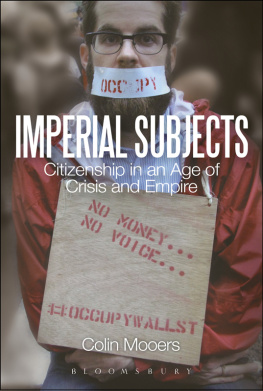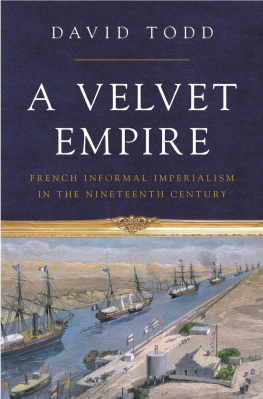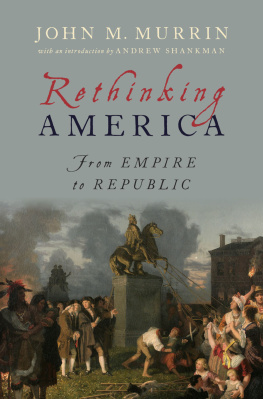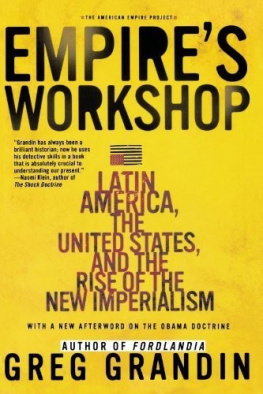Chapter 9 was previously published in University of Miami Law Review 62 (2008): 229247. Reprinted by permission.
Chapter 11 was published in a different form in The Insecure American, edited by Catherine Besteman and Hugh Gusterson (Berkeley: University of California Press, forthcoming).
First published 2009 by Paradigm Publishers
Published 2016 by Routledge
2 Park Square, Milton Park, Abingdon, Oxon OX14 4RN
711 Third Avenue, New York, NY 10017, USA
Routledge is an imprint of the Taylor & Francis Group, an informa business
Copyright 2009, Taylor & Francis.
All rights reserved. No part of this book may be reprinted or reproduced or utilised in any form or by any electronic, mechanical, or other means, now known or hereafter invented, including photocopying and recording, or in any information storage or retrieval system, without permission in writing from the publishers.
Notice:
Product or corporate names may be trademarks or registered trademarks, and are used only for identification and explanation without intent to infringe.
Library of Congress Cataloging-in-Publication Data
Rethinking America : the imperial homeland in the 21st century / edited by Jeff Maskovsky and
Ida Susser.
p. cm.
Includes bibliographical references and index.
ISBN 978-1-59451-383-1 (hardcover : alk. paper) ISBN 978-1-59451-384-8
(pbk. : alk. paper)
1. War on Terrorism, 2001Social aspectsUnited States. 2. ImperialismSocial aspects
United States. 3. United StatesSocial conditions1980. 4. United StatesPolitics and
government2001. 5. United StatesEconomic conditions2001. I. Maskovsky, Jeff.
II. Susser, Ida.
HN59.2.R48 2008
306.2097309051dc22
2008044755
Designed and Typeset by Straight Creek Bookmakers.
ISBN 13: 978-1-59451-383-1 (hbk)
ISBN 13: 978-1-59451-384-8 (pbk)
Ida Susser
As this book goes to print, we are at a turning point in U.S. politics. After eight years at the helm, the Republican Party has lost the presidency as well as control of both houses of Congress, and in this historic election, an African American has, for the first time ever, been chosen as president of the United States. And earlier in 2008, we saw for the first time both an African American man and a white woman compete seriously in the presidential primaries. However, as the pages of this book document, even though these are significant symbols of change in racial and gender dynamics, they may not represent clear victories against racism and sexism.
At the same time, we are facing the worst economic crisis since the Great Depression, and perhaps as a result, we can detect in the discussion of Main Street versus Wall Street some recognition among the electorate of the increasing social inequality in the United States. We have seen an attempt by the Republican secretary of the treasury, Henry Paulson, to finance Wall Street debtors with no strings attached. Meanwhile, taking a more progressive path, the Labour Partys Gordon Brown, prime minister of Great Britain, has led governments globally to invest in and regulate banks. The United States was eventually forced to follow this lead, renegotiating its loans to invest in bank equity. As many have noted, this represented the failure and possibly the death of neoliberal ideology, with its celebration of untrammeled market forces. Yet the influence of U.S. exceptionalism and the continuing power of Wall Street were evident as Paulson invested U.S. government funds in banks without requiring the decisionmaking power that other countries enforced in their nationalization of banks. Thus, with historical precedent, government subsidies for corporations have become acceptable, even as the possibility of public investment in Main Street is still in question.
Since the late 1990s, the period framed by this book, the neoliberal neoconservative government in the United States has left an indelible imprint, and the direction to be taken from here has still to be determined. As the center of global capital, at least until the current economic crisis, the United States has also been the country in the Western world arguably most vulnerable to neoliberal policies on the domestic level. As documented in this book, since the 1990s, policies such as welfare reform and the privatization of government services have undermined all aspects of the public weal.
Since 2001, as George W. Bush led the nation to war in Afghanistan and then, more significantly, in Iraq, the United States has been thoroughly transformed internally. We now have the outer shell of an older democratic welfare state along with the inner workings of a neoliberal dictatorial regime. Along with the wars, the neoconservative regime brought about the shredding of the rights of middle-and working-class residents of the United States. As President Bush argued about decisions on troop deployment, secret wiretapping, prisoners, and suspects of terrorism, executive privilege trumped all. In this, the president was supported by the Supreme Court, which he weighted in his favor with the appointment of two conservative justices, John Roberts and Samuel Alito, who has been working for twenty years on the idea of a unitary executive or greater, opaque power for the president. These appointments created a conservative majority on the Court to protect the presidents policies.
In the treatment of prisoners taken in Iraq and Afghanistan and kept in Guantnamo, historical democratic rights of habeas corpus were rejected by the president and the newly appointed Supreme Court justices. Millions of people from Iraq and Afghanistan have been displaced, injured, or killed (low estimates of civilian deaths in Iraq alone approximate 100,000), and the immediate costs of empire to the United States are evident in the loss of over 4,000 American lives in the Iraq War and in the 20,000 soldiers who have returned home gravely injured, only to confront the neglect of a previously well-regarded Veterans Administration (VA) hospital system. As the military, too, is privatized, we must also include in these losses the death of 1,000 or so private contractors and the wounding of another 11,000 individuals among this population. The spectacle of foreign deaths may obscure the domestic readjustments of life in the United States, including the harsh realities of ongoing impoverishment, the shortening of life due to the increasing gap between rich and poor and the legacy of racism, and the neglectful deaths of people in situations such as Hurricane Katrina.
We can perhaps begin with the obvious costs of Katrina, which struck in August 2005. More than 1,700 counted and more uncounted deaths were due to the failure of the Army Corps of Engineers to fix the levees around New Orleans and the failure of the Federal Emergency Management Agency (FEMA) to help in the evacuation of the poor people of the city. FEMA had become a shadow of its former selfstripped to the barest public relations officers; administrators who had knowledge and experience had long before been replaced with political appointees. As happened in New Orleans, neoliberal policies endangered and continue to endanger vital infrastructure in many parts of the country, including bridges and interstate highways. Meanwhile, the levees of large sections of New Orleans still remain to be repaired and rebuilt, perhaps creating jobs for working people in the current economic crisis, even as we witness the demise of neoliberal ideology.











